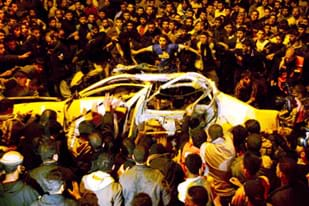Fidel Castro has suggested he may formally give up his leadership posts.
It is the first time the Cuban leader, who has not been seen in public for 16 months, has spoken of his possible retirement.
Castro had surgery in July 2006 and is 81-years old.
In a letter read out on Cuban television on Monday, Castro wrote: "My elemental duty is not to cling to positions, or even less to obstruct the path of younger people, but to share experiences and ideas whose modest worth comes from the exceptional era in which I lived."
Castro's letter, read out on a daily television current affairs programme, suggests he will not resume office, but instead take on the role of elder statesman advising the country's communist government on key issues.
Lucia Newman, Al Jazeera's Latin American editor, said the letter has surprised many given that a couple of weeks ago he said he would stand for National Assembly elections in January.
"He seems to suggest that he is not planning to run in next month's national elections," she reported.
"He has been saying all along that his position should be more akin to that of an elder statesman, and he seemed to have reinforced that in tonight's letter.
"When he speaks of a younger generation, who was he speaking of? ... Probably not his brother [Raul Castro], only five years younger than him, and currently the acting president."
[b]Interim President[/b]
Larry Birns, director of the Council on Hemispheric Affairs, told Al Jazeera that while there is no immediate long-term replacement for Fidel, his brother Raul is likely to be the interim figure.
"At 76-years old, he [Raul] can only think in terms of the interim. This is not a long-lasting appointment," he said.
"It's certainly true that people like foreign minister [Felipe Ramon Perez] Roque, and national assembly president, Ricardo Alarcon... These are the people that will be the natural leaders in years to come.
"I would imagine that the Raul Castro era would last no more than five years... And then we move into this younger generation that [Fidel] Castro is talking about."
[b]Presidential power[/b]
Castro holds the posts of president of the Council of State and Council of Ministers, and first secretary of the ruling Communist party.
Cuba's National Assembly could formalise Castro's retirement as head of state when it approves the members of the executive Council of State in March.
Castro, who took power in a 1959 revolution, temporarily handed over power to his brother, Raul, in July 2006 after undergoing stomach surgery.
There has been much talk about Castro's health and his latest announcement will certainly fuel even more speculation, Newman said.
But the leader also indicated that he was not about to fade from the scene, noting the example of famed Brazilian architect Oscar Niemeyer who is still working and to whom Castro paid homage with an essay to mark his 100th birthday on Saturday.
"I think like Niemeyer that you have to be of consequence up to the end," Castro said.
Seven out of 10 Cubans were born after Castro's revolution and have known no other leader. As a result, many are unsure what the future holds after his departure.
Source: aljazeera








